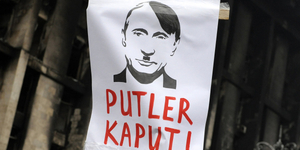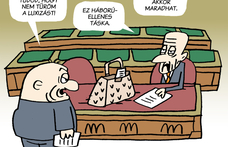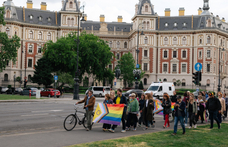The criminal psychologist Jozsef Vegh is a busy man, known for his frequent media appearances. I bumped into him in the foyer of the television building, where he was waiting to give an interview. Even now, you can only enter the former Stock Exchange Palace from the rear entrance on Nador utca - the main entrance still bears the scars of the siege. Jozsef Vegh's work means he knows the leaders of the police, and he is also a specialist in hostage negotiations.
What would you have done if you had been in the position of Peter Gergenyi, the Budapest police chief, if you had been subject to so many political attacks?
Probably just what he did. Gergenyi was an experienced police chief who learned to deal with crises alongside his colleagues. It is worrying that his place is being taken by people with less experience who will react poorly if they encounter situations like those we have seen recently.
So you are happy with the police's crowd dispersal techniques?
I'm happy with how they reacted as a body. At the same time, quite a few policemen lost their heads during the clashes and made serious professional errors. Not all the senior officers were in control of events: they underreacted to the TV siege, but overreacted a month later. On 17 September, ill-prepared policemen encountered an increasingly angry crowd, some of whose members were armed with iron rods, stones and baseball bats. On 23 October, a few policemen, those who felt frustrated and hurt, lost their professional self-control. They wanted to take revenge on the protesters who were baiting them. This was a serious professional mistake.
Are policemen not trained to deal with these kinds of situation?
Of course they are. Members of the Public Order Security Services receive psychological and conflict resolution training every year - I gave some of those training sessions myself. Even constables sometimes encounter the kind of situations we saw on 23 October. You often have to deal with the kind of "hit me if you dare" mentality that the crowd had that day: citizens provoke the police until they are either forced to use the force of the law, or they strike back at the citizen, illegally.
Why would somebody do that without any provocation?
People like that want to unbalance the policeman, so they start playing these kinds of 'street games'. They find this kind of intentionally-created stress situation exciting. Their body produces vast amounts of endorphines, adrenaline and testosterone, so they overreach. It's a common kind of personality disorder: people want to unwind all of that tension, so every few weeks they try to get into a fight with the police, with people on the street, and they are prepared to provoke people to get what they want. Interestingly, such people tend not to make complaints about police brutality.
So they're not like the people who turned to the public prosecutor because they had been beaten on 23 October? Can incidents like that be avoided in future? 4 November was encouraging from this point of view.
Learning to be democratic is a long process, and every individual has to learn it in his own way. It can't be taught in the classroom, and we are still at the beginning of that process. In longer-established democracies, people are better at decyphering other people's metacommunication, and they are more experienced in dealing with street games. Everything depends on the decision you make in a given instant and on your understanding of the situation. But you have to understand that for most people, 93 per cent of communication is non-verbal, and only 7 per cent can be expressed in words. It's the same at demonstrations, and both police and protesters have to be aware of this.
János Pelle


















